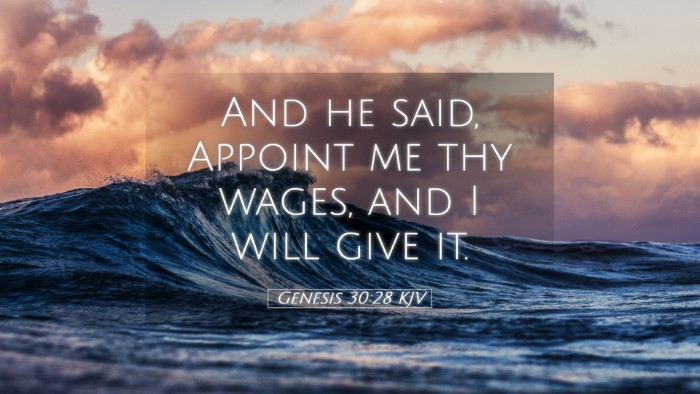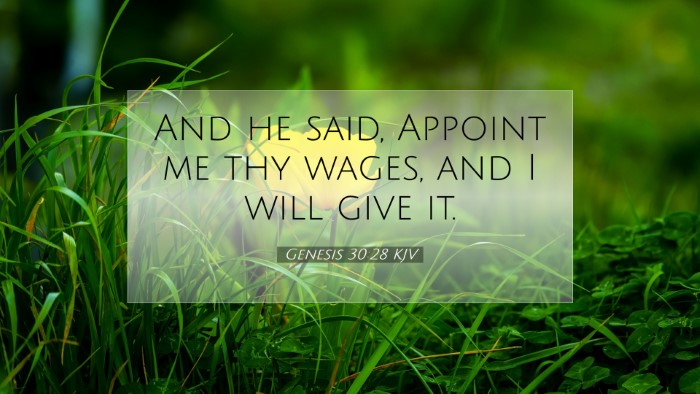Commentary on Genesis 30:28
Genesis 30:28 states: "And he said, Appoint me thy wages, and I will give it." This verse is situated in a crucial narrative within the life of Jacob, where he negotiates the terms of his service with Laban, his father-in-law.
Contextual Background
This verse must be understood within the broader context of Jacob's experiences with Laban, a man who represents both family and conflict for Jacob. Over the years, Jacob has served Laban faithfully, contributing to Laban's prosperity. However, the dynamics of their relationship are strained due to issues of fairness and trust.
Significance of Wages
Matthew Henry emphasizes that the request for wages is not merely a transactional interaction but rather a reflection of Jacob's growing wisdom and agency. Jacob recognizes that he must secure his own future after years of service, showcasing a crucial turning point in his character development.
Henry points out that Jacob's question is intentional, underlining the importance of establishing a more equitable relationship with Laban, who has taken advantage of Jacob's loyalty. In essence, Jacob's demand represents a reclamation of dignity and a move towards self-sufficiency.
Negotiation Themes
Albert Barnes comments that this verse highlights the theme of negotiation which pervades human relationships. Jacob's proactive approach in seeking a clear agreement can be seen as a model for interpersonal dealings.
Barnes notes that the act of asking for wages implies an understanding that credit must be given where it is due. This was not just a matter of livelihood for Jacob, but also a matter of justice as he sought to correct the imbalances that had been present in his dealings with Laban.
Covenantal Aspects
Adam Clarke addresses the covenantal undertones in Jacob's request. The idea of compensation resonates deeply within the Biblical narrative where fairness and covenantal fidelity are valued. Clarke posits that Jacob’s insistence on fair wages is reflective of God’s character, advocating justice and righteousness in human affairs.
This interaction can also be viewed as a precursor to God's eventual promise to Jacob, whereby his faithfulness would be rewarded, not just materially but also spiritually. Clarke suggests that this moment is pivotal in God's unfolding plan for Jacob's lineage.
Theological Implications
The request found in Genesis 30:28 serves several theological implications:
- Human Agency: Jacob's initiative represents the necessity of human agency in God’s providence. It signifies that while God is sovereign, He invites humans to participate actively in shaping their destinies.
- Justice and Fairness: This request preaches the essential Biblical tenet of justice. In a world where the powerful often exploit the weak, Jacob’s assertion for fair wages resonates with the scriptural call for just treatment and fairness in all dealings.
- The Role of Faith: By making this request, Jacob demonstrates faith in God’s provision. It reflects a belief that God would protect and provide for him as he steps into this new phase of life.
Practical Applications
For pastors and theologians, Genesis 30:28 invites several practical applications:
- Encourage Negotiation and Fairness: This verse can be a springboard for teaching congregants about the importance of fairness in their professional and personal dealings. It serves a reminder that negotiating for one's value is both a righteous and necessary stance.
- Resource Management: Churches and organizations can use this story to enlighten leaders on the importance of compensation and fair treatment of all involved in ministry and mission work.
- Faith in Action: Jacob's actions encourage believers to maintain faith that God will work through their circumstances as they seek fairness and justice in their lives.
Conclusion
Genesis 30:28 encapsulates a moment of deep significance within the life of Jacob, presenting themes of justice, negotiation, faith, and human agency. By studying this verse alongside insights from historical commentators, we discern the timeless relevance of these themes that continue to resonate today.


